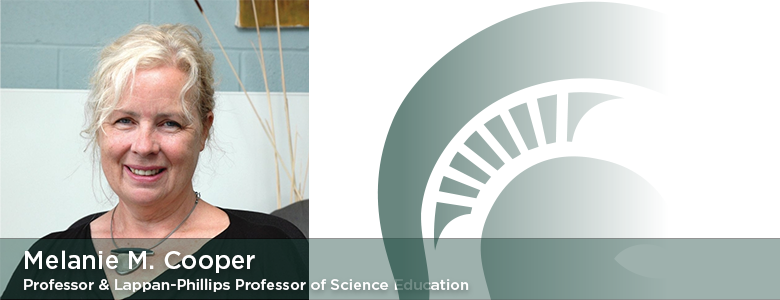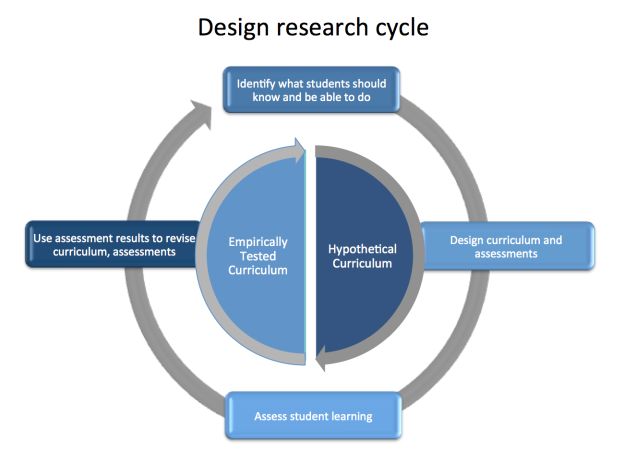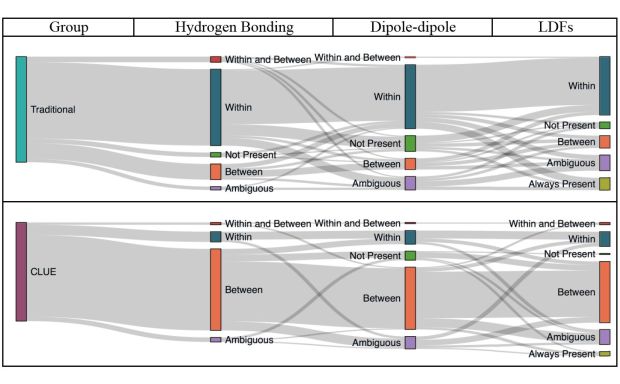Melanie M. Cooper

Research
Evidence-based Approaches to Improving Chemistry Education
(Research Description PDF)
The focus of our research is to develop evidence-based approaches to teaching, learning and assessment. Our work involves a wide range of activities and methods including designing ways to assess both what students know and how they use their knowledge, developing curriculum materials, and evaluating the effects of transformation efforts both within and across disciplines.
Our approach to curriculum transformation uses a design-based research cycle in which we identify what students should know and be able to do, design and implement a curriculum that would meet these goals, assess student achievement, and use the results of the assessments to revise the curriculum and accompanying assessment materials These assessments require students to construct (free form) structures, diagrams, and models, and to develop explanations for phenomena. Our formative assessment system, beSocratic (http://besocratic.com), is designed to recognize and respond to student input.
Examples of this process are Chemistry, Life, the Universe and Everything (CLUE), an NSF supported general chemistry curriculum, and Organic Chemistry, Life, the Universe and Everything (OCLUE) (both developed in collaboration with Mike Klymkowsky, University of Colorado at Boulder).
Using this system, we have evaluated how students in both traditional and CLUE curricula understand a range of chemical ideas and phenomena. For example, we have shown that both CLUE and OCLUE students are more likely to construct causal mechanistic explanations for phenomena such as acidbase reactions, nucleophilic substitutions and how London dispersion forces arise.

Current research projects include investigations of the impact of classroom culture on student learning, how students learn to use mechanistic arrows to predict and explain reactions, how energy ideas are used across disciplines, how mechanistic reasoning emerges across disciplines.
Contact / Webpage
Area(s) of Interest
Chemical Education (CE)
Selected Publications
Developing computational resources to automate analysis of students’ London Dispersion force explanations, Noyes, K.N. Cooper, M.M., J. Chem. Educ. 2020, 97, 11, 3923–3936. https://doi.org/10.1021/acs. jchemed.0c00445
Arrows on the Page Are Not a Good Gauge: Evidence for the Importance of Causal Mechanistic Explanations about Nucleophilic Substitution in Organic Chemistry, Crandell, O.M.; Lockhart, M.A.; Cooper, M.M., J. Chem. Educ. 2020, 97 (2), 313–327. https://doi.org/10.1021/acs. jchemed.9b00815.
Organic Chemistry, Life, the Universe and Everything (OCLUE): A Transformed Organic Chemistry Curriculum, Cooper, M.M.; Stowe, R.L.; Crandell, O.M.; Klymkowsky, M.W., J. Chem. Educ. 2019, 96 (9), 1858–1872. https://doi.org/10.1021/ acs.jchemed.9b00401. ACS Editors Choice
Investigating Student Understanding of London Dispersion Forces: A Longitudinal Study, Noyes, K.; Cooper, M.M., J. Chem. Educ. 2019, 96 (9), 1821–1832. https://doi. org/10.1021/acs.jchemed.9b00455.
Chemistry Education Research—From Personal Empiricism to Evidence, Theory, and Informed Practice, Cooper, M.M.; Stowe, R.L., Chem. Rev. 2018, 118 (12), 6053–6087. https://doi.org/10.1021/acs. chemrev.8b00020 ACS Editors Choice
Evaluating the Extent of a Large-Scale Transformation in Gateway Science Courses, Matz, R.L.; Fata-Hartley, C.L.; Posey, L.A.; Laverty, J.T.; Underwood, S.M.; Carmel, J.H.; Herrington, D.G.; Stowe, R.L.; Caballero, M.D.; Ebert-May, D.; Cooper, M.M., Sci. Advances 2018, 4 (10), eaau0554. https://doi.org/10.1126/sciadv.aau0554.
CV
B.S., 1975, Univ. of Manchester, England
M.S., 1976, Univ. of Manchester, England
Ph.D., 1978, Univ. of Manchester, England
Professor, 1987-2012, Clemson University
Honorary Doctor of Science, 2016, Univ. of South Florida
Fellow, 2017, Royal Society of Chemistry
Awards
| Year | Award | Organization |
|---|---|---|
| 2021 | Postdoctoral Mentoring Award | College of Natural Science |
| 2020 | Royal Society of Chemistry Honor | |
| 2018 | MSU Alumni Club of Mid-Michigan Quality in Teaching Award | |
| 2017 | Undergraduate Teaching Award | College of Natural Science |
| 2016 | Honorary Doctorate of Science | University of South Florida |
| 2015 | Best Technology Enchancement Award of Excellence | |
| 2014 | Achievement in Research for the Teaching and Learning of Chemistry. | ACS |
| 2013 | James Flack Norris Award for Outstanding Achievement in the Teaching of Chemistry | |
| 2013 | MSU Lappan-Phillips Professor of Science Education |
